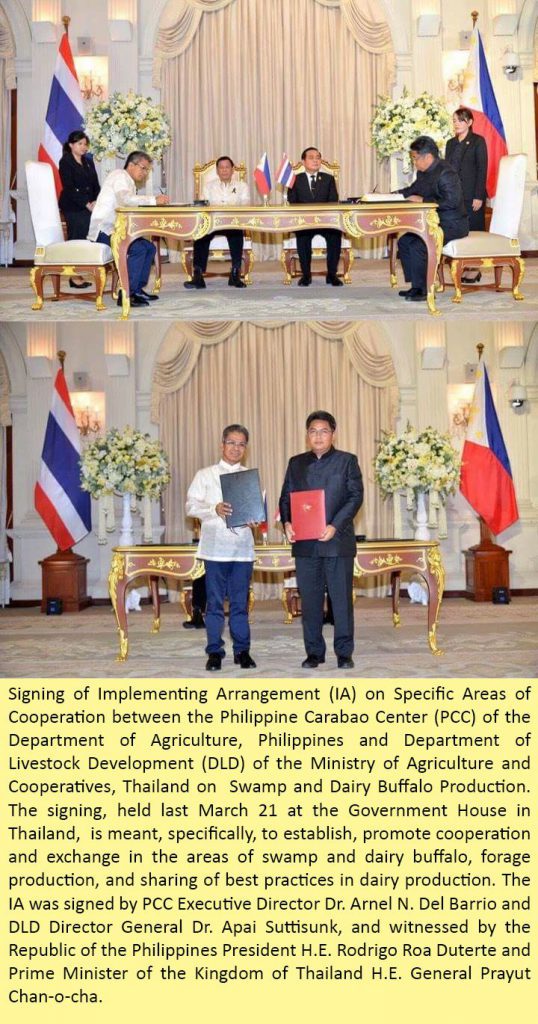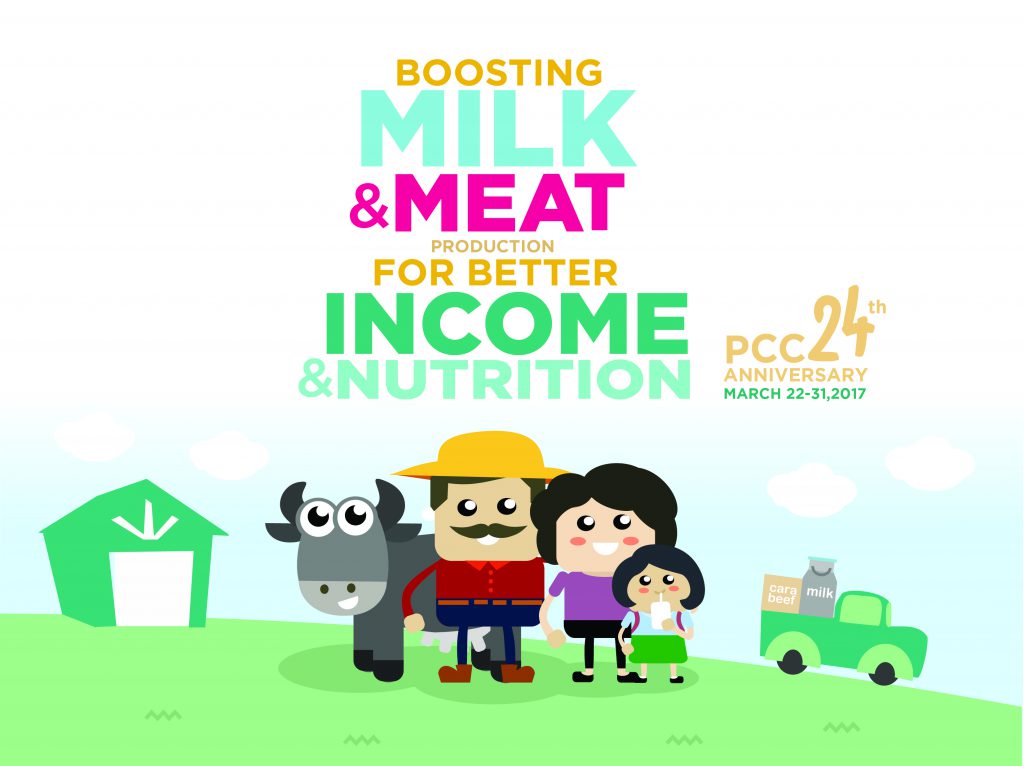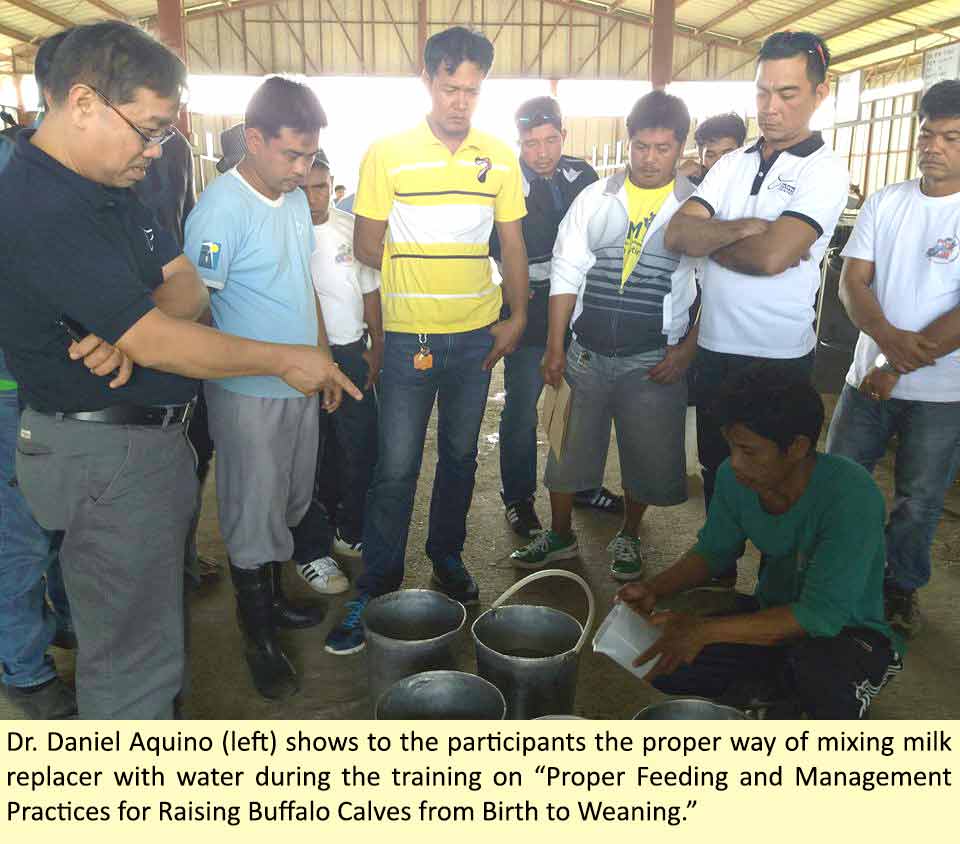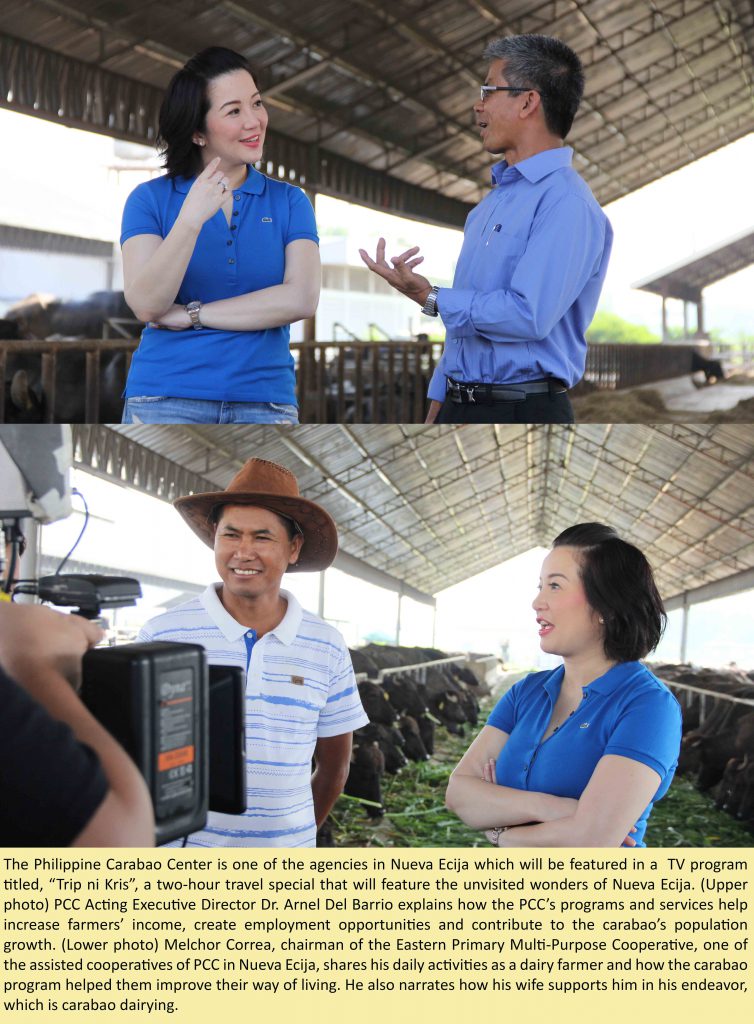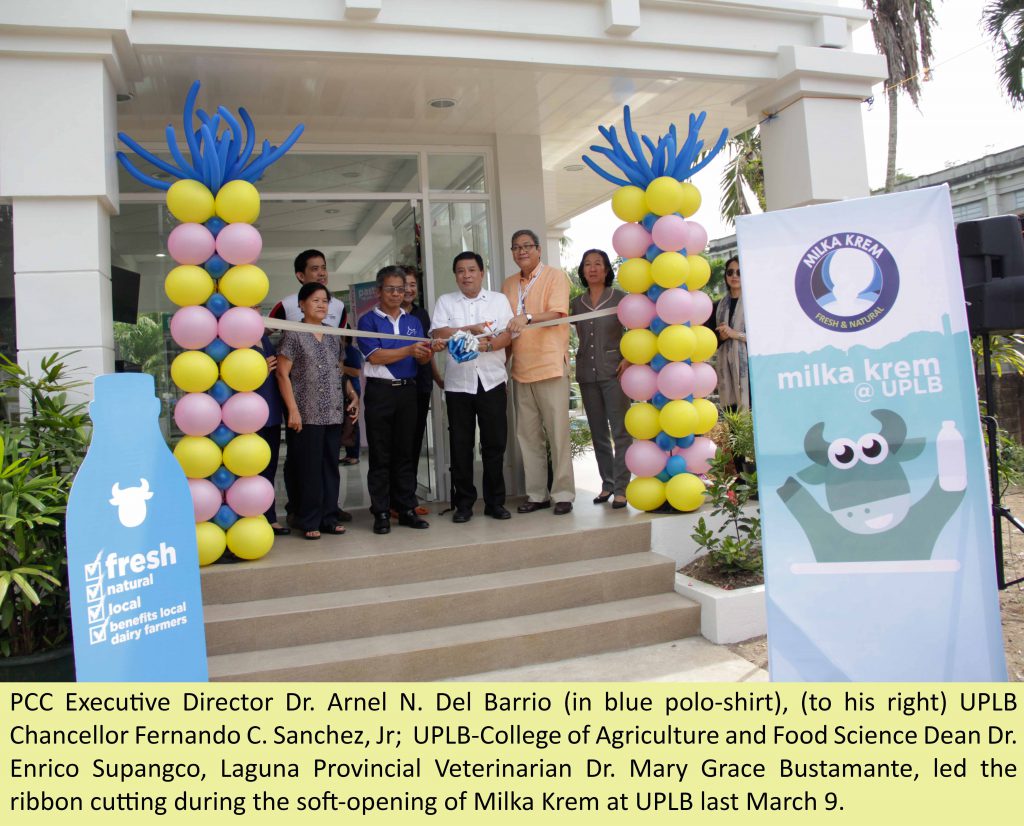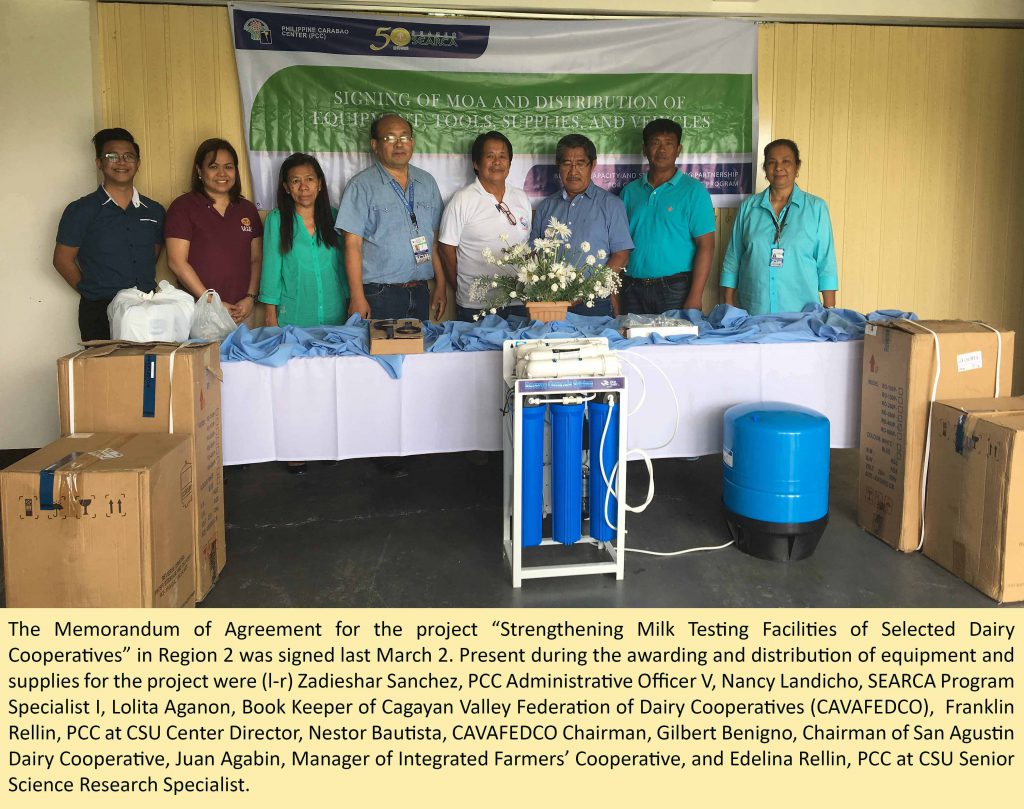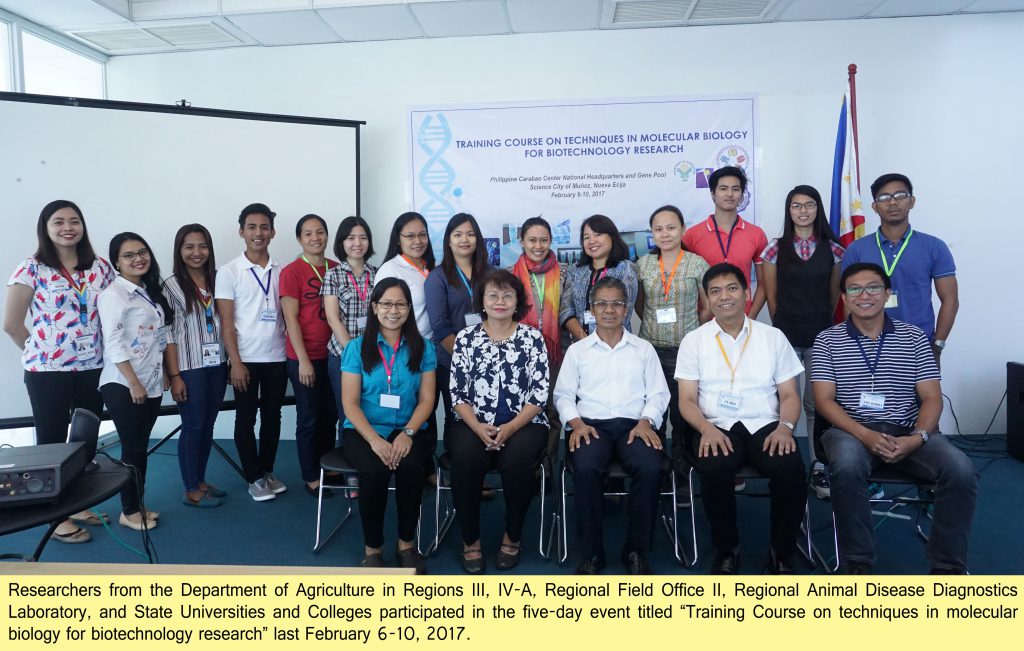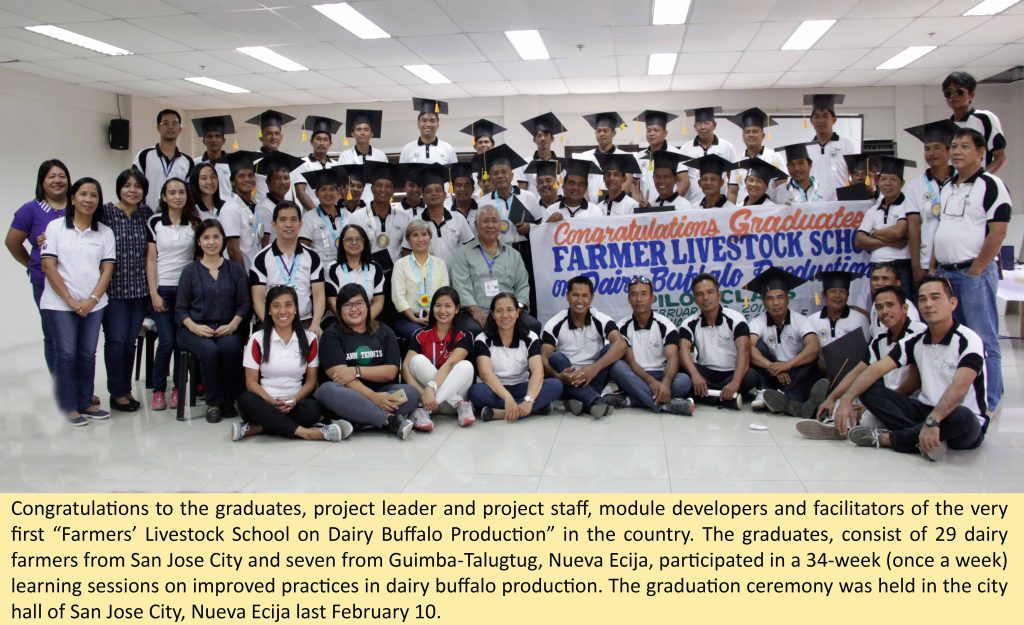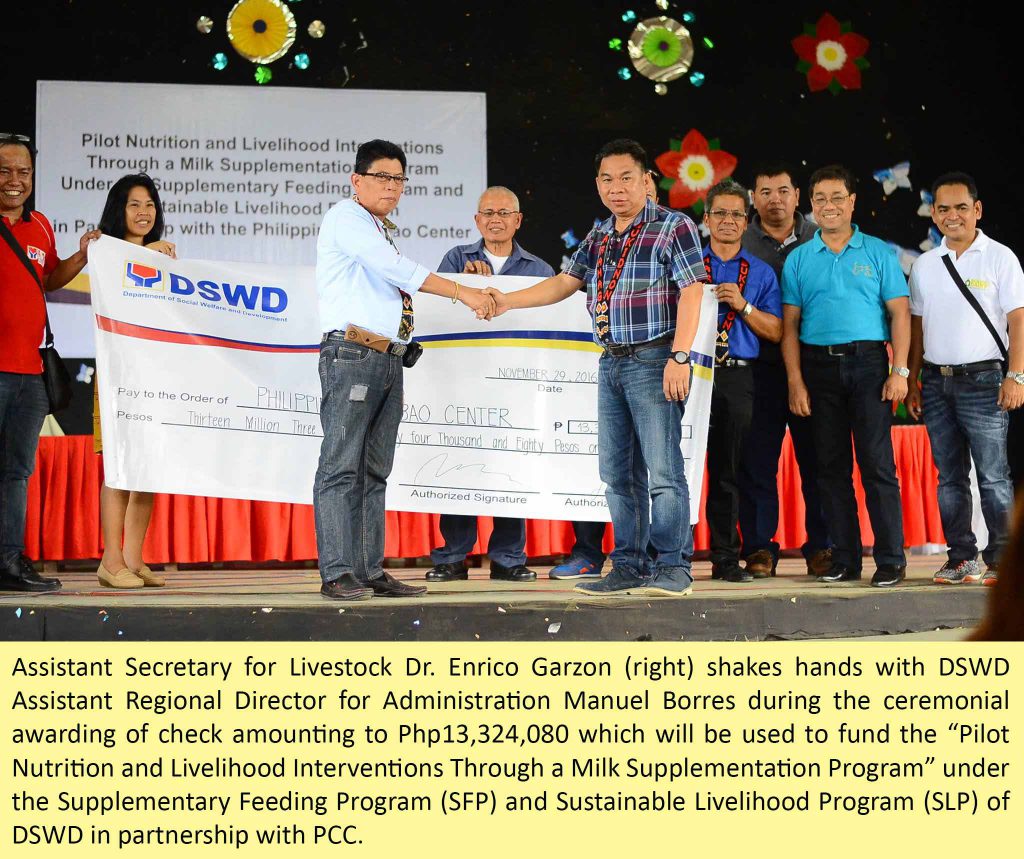Author: PCC
PCC to celebrate 24th anniversary
With its unwavering commitment to enhance technologies and practices that conserve, propagate and promote the carabao as a source of milk, meat, and draft power for the benefit of small-holder farmers, the Philippine Carabao Center (PCC) will be celebrating its 24th anniversary on March 22-31, 2017.
This event’s theme, “Boosting milk and meat production for better income and nutrition”, is in support of the basic mandate of the Department of Agriculture in securing the food supply of the country, according to Dr. Eric Palacpac, Chief of the Knowledge Management Division of PCC.
“Here at PCC, we are focusing on increasing the volume and quality of meat and milk from the carabao. This will lead to increased incomes for the farmers and other key players in the carabao industry, and better nutrition for the consumers of carabao’s milk and meat,” he explained.
Sen. Cynthia Villar, Chair of the Senate Committee on Agriculture and Food will serve as the keynote speaker during the anniversary program on March 28.
There will be an awarding of purebred buffaloes, equipment, and supplies to partner-farmer-cooperatives and institutions during the event.
The plenary sessions will be in the afternoon of the same day. The agency’s “Partnership with DSWD on milk supplementation”, “Value Chain Analysis of Carabao and Carabao-based Products in Visayas and Mindanao”, “Status of carabao industry and updates on listing of dairy enterprises”, “MILK-P (Mga Impormasyon at Lokasyon ng Kalabaw sa Pilipinas) geo-tagging of carabaos and CBED (Sindangan Model)”, will be presented.
Furthermore, the R4D pre inhouse review will be held in two parts, i.e., on March 24 and 29. This activity will present on-going and recently completed researches that aim to address the carabao industry’s gaps and concerns.
“We expect 500 PCC employees, farmers, and representatives from different government agencies and private entities to attend the event,” Dr. Palacpac said.
The “Gabi ng Parangal”, where awards will be given to outstanding employees of the agency, will be on March 30.
Selected dairy farmers undergo training on proper feeding, management of dairy buffalo calves
Fourteen dairy farmers gained better understanding of the common issues on animal health and nutrition including the economic benefits of using alternative milk supplements thru a farmers’ training on “Proper Feeding and Management Practices for Raising Buffalo Calves from Birth to Weaning” last March 7 at the PCC national headquarters, Science City of Muñoz in Nueva Ecija.
The said training is in line with the project 1 component of the Philippine Council for Agriculture, Aquatic and Natural Resources Research and Development (PCAARRD)-funded research titled, “Development of Feeding Protocols and Practices to Support the Nutritional Requirements of Dairy Buffaloes”.
“Having a successful calf raising operation is not only important financially, but also important for the future of the herd. This training will help them plan and manage their calves properly and economically thru the use of milk substitute,” Dr. Daniel Aquino, project leader and center director of PCC at CLSU, said.
According to him, the use of alternative source of milk for calf like milk replacer is one of the strategies in increasing the income of dairy buffalo farmers because of the potential savings that it offers.
“Dairy farmers can sell all their harvested milk because calves are fed with milk replacer instead of giving them two liters of the dam’s milk. This means additional income for the farmers,” he added.
Based on the publication of Bovine Alliance on Management and Nutrition, high quality calf milk replacers, when correctly matched to the specific calf rearing systems and properly fed to calves, provide several benefits to the dairy producer and calf raiser. These benefits include improved biosecurity, calf performance, and economics.
PCC executive director Dr. Arnel Del Barrio, on the other hand, said that practicing proper feeding management can reduce high mortality rate among dairy calves.
The training comprised of lectures, workshops, and actual demonstration on how to mix milk replacer with water and the proper way of feeding this to calves.
“This one-day training only serves as an orientation for the participants. The project team will conduct an actual visit to their farms to thoroughly teach them and monitor their feeding systems since mixing the milk replacer is a crucial step,” Christian Lacanilao, PCC science research assistant.
The training was attended by farmers from the different cities and municipalities in Nueva Ecija. The selection of the participants was based on their current number of calf in the herd, interest and commitment to participate, and their willingness to learn new things about calf rearing.
After the training, the participants were also given bags of milk replacers as an alternative source of milk for their calves for three months before weaning.
‘Trip ni Kris’ show to feature PCC
Milka Krem opens new branch store at UPLB
A new branch store of Milka Krem was recently opened at the University of the Philippines-Los Baños (UPLB).
It was established to serve as a technology demonstration and learning hub and where the Philippine Carabao Center (PCC) at UPLB and farmers could sell their dairy buffalo products.
Among the dairy products available at the said store are fresh milk, choco milk, coffee milk, fruit-flavored juices, white cheese, mozzarella, pastillas de leche, assorted flavors of yoghurt and yoghurt drink, flavored yema and ice cream. These are products of PCC@UPLB under the brand name Carabest and of the four dairy cooperatives and/or associations being assisted by the said center such as the General Trias Dairy Raisers Multi-Purpose Cooperative, Rosario Dairy Raisers Association, Magdalena Dairy Raisers Association, Llano Farmers Multi-Purpose Cooperative; and private entrepreneur from Balayan, Batangas.
“The creation of Milka Krem at UPLB upholds the PCC’s mandate on promoting food safety using quality control protocols and modern dairy processing technologies that can be adopted by private entrepreneurs and business sectors,” Dr. Arnel N. Del Barrio, Acting Executive Director of PCC, said during the store’s soft-opening on March 9.
Meanwhile, Dr. Flordeliza Lantican, UPLB retired professor and lead researcher of the “Value Chain Analysis for Carabao and Carabao-Based Products”, said that the creation of Milka Krem at UPLB is a great opportunity for farmers, cooperative and association in CALABARZON, MIMAROPA and the Bicol Regions to have an access to commercial market for bigger income.
“In our conducted study on the value chain analysis, we discovered that market is one of the problems of the key players in selling their milk and meat products to the public. With the creation of Milka Krem at UPLB, there’s no reason for them not to succeed in their dairying businesses,” Lantican emphasized in her talk during the event.
The 300 sq m facility worth Php10 M is located beside the UPLB’s Baker Memorial Hall. Its soft-opening coincided with the UPLB-College of Agriculture and Food Science (CAFS) 108th foundation day and PCC’s 24th anniversary celebration.
Also present during the event were UPLB Chancellor Dr. Fernanco C. Sanchez, Jr; Dean Enrico P. Supanco of UPLB-CAFS; National Dairy Authority Representative Warren C. Pagdato; and some staff from the PCC national headquarters and its regional centers.
PCC-SEARCA study identifies weaker players in value chain for carabao, carabao-based products; interventions supplied
In the production of carabao and carabao-based products up to the marketing aspects, who gets the least benefits?
Mostly those in the production site, who are the farmers and the producers, studies revealed.
“They are the identified weaker players,” results of the studies on the Value Chain Analysis (VCA) said.
The study, according to Zadieshar Sanchez, Administrative Officer V of the Philippine Carabao Center (PCC), was conducted in Luzon in Nueva Ecija, which is the designated National Impact Zone for carabao industry, in La Union (Region 1), Cagayan Valley (Region 2), Central Luzon (Region 3) and CALABARZON (Region 4a).
Sanchez said the study was part of a commissioned research project of PCC in collaboration with the Southeast Asian Regional Center for Graduate Study and Research in Agriculture. It was led by World Bank consultant Dr. Flordeliza Lantican, a renowned agricultural economist with distinct specialization in agricultural marketing and price analysis.
The study was meant, eventually, to identify those that need intervention the most in the value chain.
Those in the distribution side get the higher incomes than those on the production side, the study indicated.
“The VCA project helped in identifying the constraints and opportunities faced by the value chain players from the producing sector up to the marketing sector,” Sanchez explained.
“It also endeavored to help find ways toward achieving inclusiveness in the value-addition activities along the chain,” he added.
Provision of interventions
Corollary to the research results, each of the cooperatives and associations involved in the study, thru the help of the PCC regional center chiefs and carabao-based enterprise development (CBED) coordinators, submitted one project proposal indicating the interventions needed.
They, however, underwent capability building in a series of trainings before asking to package their respective proposals and to become ready for the implementation of their respective projects.
Subsequent developments proved beneficial for the proponents of the proposals.
“Upon thorough evaluation of five proposed projects and on-site validation of their readiness to receive such interventions, the projects have been approved for funding under the PCC-SEARCA project,” Sanchez said.
A total of 12 groups, composed of 10 cooperatives/associations and two federations in Luzon, eventually received the interventions needed.
The signing of the Memorandum of Agreement (MOA) for the project in Region 1 titled, “Enhancing the Carabao-based Enterprise (CBE) Partners’ Capability in Sustaining Animal Feed Supply through Proper Farm Waste Utilization” was held last February 16 with PCC at Don Mariano Marcos Memorial State University (PCC@DMMMSU) as the lead proponent.
The cooperatives and associations involved in the project are the Bantog Samahang Nayon Multi-Purpose Cooperative, Rosario Dairy Producers’ Association, and Organic Pares-Pares Multi-Purpose Cooperative. They received one unit of motorcycle with two-side car (kolong-kolong), three pieces of forage cutter, and 2,000 plastic bags with a 50-kg capacity each.
The MOA signing for the projects in Region 3, on the other hand, happened last February 23 and 24, respectively.
The Nueva Ecija Federation of Dairy Carabao Cooperatives in Region 3 received one unit of stainless milk cooling tank as proposed in the project.
In addition, the Malibay Aggressive Cooperative, Lambakin Agricultural Producers Cooperative, and Labne Producers’ Cooperative received interventions in their proposals. Their proposal, packaged by the PCC at Central Luzon State University, was titled, “Strengthening the CBED Partners’ Capability: Introduction of a Systematic and Hygienic Collection and Storage of Buffalo Milk in San Miguel Bulacan”.
They received one unit of motorcycle with two-side car (kolong-kolong), one unit of mobile milking machine, two-bucket milking machine with lines, 300-L capacity milk cooling tank, two stainless cans and two pails.
Last March 2, the MOA for the project “Strengthening Milk Testing Facilities of Selected Dairy Cooperatives” in Region 2 was signed. Assisted by PCC at Cagayan State University, the beneficiaries are the Integrated Farmers’ Cooperative, San Agustin Dairy Cooperative, Namnama Multi-Purpose Cooperative, and Cagayan Valley Federation of Dairy Cooperatives.
They received one unit of Porta SCC reader, one unit of water bath, three units of water distiller, three units of ecofat analyser, six pieces of lactometer with thermometer, three pieces of hand held pH meter, anti-biotic test kit, three packs of test strips, three packs of glass test tubes, and three packs of plastic test tubes, and others.
Those in Region 4A will receive theirs before the end of March this year.
The MOA was signed by PCC, SEARCA, chairman and vice chairman of coop-beneficiaries.
“The pieces of equipment are for the supply side in the value chain, which means they are either in the area of producing forage for their carabaos or milking their carabaos,” Sanchez said. “After one year, the team will conduct an economic impact analysis to assess how the beneficiaries’ income and profitability have improved,” he added.
Sanchez underscored that due to this value chain study approach, the weaker sector in the chain was identified and their preparedness and firmness to receive interventions were ascertained.
The project team is currently evaluating project proposals from the Visayas and Mindanao areas for possible funding of the needed interventions under the PCC-SEARCA project.
Researchers urged to use molecular biology techniques in biotech research
Researchers, especially on livestock biotechnology, should be familiar with molecular biology techniques as these are the forefront of most modern scientific researches in livestock, Dr. Claro Mingala, Scientist II, of the Philippine Carabao Center (PCC), said.
“We encourage more researchers to use molecular biology techniques because only a few are using them here in the Philippines,” he said.
Molecular biology is a branch of biology that deals with biological activity in molecules such as the study of genes and other macromolecules. The use of molecular biology techniques applies to animal health, reproductive biotechnology, and nutrition and genetics, among others, Dr. Mingala explains.
According to him, enhancing researchers’ proficiency on laboratory techniques is essential to ensure their competitiveness and readiness to conduct research projects on livestock biotechnology.
With this in mind, Dr. Mingala and his team at the Livestock Biotechnology Center in PCC organized a training activity on the “Techniques in molecular biology for biotechnology research”. This is in collaboration with the National Research Council of the Philippines Division XIII headed by Dr. Mildred Padilla of the College of Veterinary Medicine of the University of the Philippines-Los Baños.
The five-day activity was intended for researchers and scientists involved in molecular biology-related and biotechnological research in livestock and applied research.
“The training also aims to promote molecular biology, strengthen the biotech capabilities of researchers, and motivate them to do more researches harnessing molecular biology,” Dr. Mingala explained.
The training course focused on selected aspects of molecular biology such as those that provides principles for understanding the structure and functional relationships of molecular biology techniques including DNA manipulation, sequence analysis, phylogenetic analysis and PCR. Several examples of molecular applications were also highlighted.
Dr. Arnel del Barrio, acting executive director of PCC, highlighted in his message that translating research outputs to increased farmers’ income should be the main goal of PCC researchers.
He further encouraged the researchers to create significant impact in the industry, to the communities, and to the lives of the farmers through relevant researches.
The participants in the training responded positively to this motivation saying that while they already learned a lot in the training, they are earnest to learn more so that they can ably contribute in the industry.
“We will consider organizing more events like this in the future,” Dr. Mingala said in response to the participants’ requests.
The participants are from the regional offices of the Department of Agriculture in Regions III, IV-A, Regional Field Office II, Regional Animal Disease Diagnostics Laboratory, and representatives from State Colleges and Universities.
Farmer Livestock School pilot class graduates, now ready to apply new learnings in dairy buffalo production
Thirty-six dairy farmers in Nueva Ecija recently graduated from the very first “Farmer Livestock School on Dairy Buffalo Production (FLS-DBP)” in the Philippines and are expected to implement good practices in their dairy buffalo production systems to increase efficiency and income.
Said FLS graduation was held last February 10 at the City Hall of San Jose City in Nueva Ecija. Those who graduated were 29 dairy farmers from San Jose City and seven from Guimba-Talugtug in Nueva Ecija.
According to Dr. Eric Palacpac, project leader, FLS-DBP is primarily aimed at developing extension modalities for the holistic delivery of extension services and strengthening technology adoption among village-based dairy buffalo farmers.
“This graduation day is proof that we have an output in our effort to strengthen extension support to buffalo farmers. We expect to see significant improvements in your practices on dairy buffalo production that will result in higher income. If you don’t adopt and practice the knowledge you gained from this project, our efforts will be futile,” Dr. Palacpac said as he welcomed the participants and guests in the ceremony.
Select farmers shared their respective testimonies on how the project helped them improve their practices on dairy buffalo production.
Emily Velasco of Simula ng Panibagong Bukas Producers Cooperative (SIPBUPCO) said the FLS helped her explore other benefits of carabao dairying. She shared that she now gets additional income not only from milking her dairy buffaloes but also from vermicomposting using carabao manure.
“I will definitely regret it if I didn’t join this project. It helped me a lot. Even though I have personal activities to attend to, I always prioritize our FLS schedule to improve my knowledge and skills on dairy production,” she said.
Florencio Madulid of Eastern Primary Multi-Purpose Cooperative (EPMPC) imparted his learnings on proper feeding management and recording. He also shared that he has been applying the good practices that he learned from the FLS since it started.
“I used to feed my dairy animals with fodder before but because of FLS, I am now supplementing them with dairy concentrates and it really helped boost their milk production. I want to thank those people behind this project. I will surely impart my knowledge and learnings to my fellow dairy farmers,” he said.
Ludivico Guieb of Ayos Lomboy Producers Cooperative (ALPC), on the other hand, encouraged his fellow dairy farmers to adopt care and management practices that is taught in the FLS so that they will also attain increased milk production, contributing to the PCC’s target of recording two million liters of carabao’s milk annually.
“This FLS has taught me so much about properly taking care of my dairy buffaloes . I am asking everyone here to believe in the full potential of your carabaos to produce more milk. Eventually, we will all succeed in this venture if only we apply all our learnings,” Guieb averred.
Ferdinand Guillermo of Cinense Dairy Association (CDA) shared his new knowledge on the importance of the buffaloes’ good nutrition and proper milk handling. He said he also learned a lot about the other kinds of forages that can be used as feedstuff.
“When you are into dairying, nothing is wasted. You are earning from buffalo’s milk and at the same time from its manure,” he said while smiling.
After the testimonials, outstanding dairy farmers who have excelled in their performance along the course were recognized during the ceremony.
According to Rovelyn Jacang, PCC Science Research Specialist II and one of the project staff, the criteria for the selection of top-performing dairy farmers include application of technologies taught during discussions (50%), written examination (20%), class participation (20%), and complete attendance (10%).
For the San Jose cluster participants, Moises Alfonso was given the “Gold Farmer” recognition, Gilbert Daduyo the “Silver Farmer”, and Jessie Villanueva the “Bronze Farmer”; they are all members of EPMPC.
For the Guimba-Talugtug cluster, Ludivico Guieb of ALPC was the “Gold Farmer”, Ferdinand Guillermo and Edmar Lagliva of CDA were “ Silver and Bronze Farmers”, respectively.
Those who received special awards were Rogelio Peñaflor, Emily Velasco, Romeo Venturina, Jimuel Grospe, Ferdinand Guillermo, Onofre Dayag, Lee-Ar De Vera, and Edmar Lagliva for their active participation during FLS sessions.
Also present during the graduation ceremony were Dr. Felomino Mamuad, PCC deputy executive director; Dr. Ruth Miclat-Sonaco, center director of International Training Center on Pig Husbandry, Alexander Bautista, city administrator; Ms. Anna Marie Alo, supervising science research specialist of the Philippine Council for Agriculture, Aquatic and Natural Resources Research Development (PCAARRD); FLS project staff Jacang and Erwin Valiente, PCC Science Research Specialist II; and FLS-DBP facilitators Estella Valiente, PCC Science Research Specialist II; Daniel De Vera, agricultural technologist; Allan Dayag of CDA; Teody Nieva of Guiset Organic Farmers Credit Cooperative; Lumicio Magtalas of San Rafael Dairy Producers Cooperative; Melchor Correa and Eliseo Mislang of EPMPC; Freddie Carlos of SIPBUPCO; Ma. Theresa Sawit, PCC Senior Science Research Specialist; and Gina Tuquero.
The 34-week project ran every Fridays for San Jose cluster and every Wednesdays for Guimba cluster guided by accredited FLS-DBP facilitators.
It is hoped to be replicated in other impact zone areas of PCC to benefit more farmers. Meanwhile, the pilot class of FLS-DBP in the Ilocos Norte cluster is expected to graduate in March this year.
PCC, DSWD, partner-LGUs launch milk supplementation program for daycare pupils in Region 10
DA-PCC and DSWD recently launched a pilot convergence program on milk supplementation for Region 10 in cooperation with the local government units (LGUs) of Maramag, San Fernando and Damulog, Bukidnon. Said launching was held at the Maramag Gymnasium in Bukidnon last January 31.
A ceremonial awarding of check amounting to Php13,324,080 to PCC and cooperating LGUs highlighted the launch. Said amount was transferred by DSWD to PCC on November 29, 2016 to cover the purchase of milk that will be provided to 10,094 children registered in the target pilot Child Development Center (CDC) areas in Regions III, VII and X for 120 days.
The launch was also highlighted with a showcase of talents by the children-beneficiaries through dance performances and poetry recitals.
Present in the event were Dr. Enrico P. Garzon, Department of Agriculture Assistant Secretary for Livestock; Manuel M. Borres, Assistant Regional Director for Administration; Atty. Jose Doromal, Vice Mayor of Maramag; guests from the central office of DSWD and PCC, 200 children-beneficiaries and their parents, CDC workers, and staff from participating LGUs.
In his speech, Asec. Garzon encouraged government agencies to find ways to collaborate and significantly contribute to the present administration’s goal of ending hunger and poverty in the country through accessible and affordable food for all.
“This partnership program of PCC and DSWD will not only provide an opportunity for the children of less privileged families to improve their nutritional status but will also motivate farmers to produce more milk because there is ready local market where they can supply their products. Through partnership, government agencies will be able to reach more sectors of our society,” Asec. Garzon explained.
Vice Mayor Borres, on the other hand, said the province of Bukidnon is fortunate to be the pilot site of the milk supplementation program.
“Each of the project stakeholders should see himself/herself as part of the project with a role or purpose to perform. The project gives meaning to the lives of the stakeholders when their purpose and involvement is clear,” he added.
Mary Joy Embate, one of the parent-representatives, expressed her gratitude and thanked the implementing agencies for extending nutrition support to their children. It makes her feel secured knowing that her child is well taken cared of in the child development center.
“Every time I ask my child after fetching her from the center, ‘What would you like to eat?’, my child answers, ‘I’m fed and full, Mom’,” Embate says.
The pilot DSWD-PCC convergence project consists of two components: milk supplementation and livelihood.
The milk supplementation component aims to improve the height and weight for age of the children using the Child Growth Standard (CGS) by providing the children with 200ml of toned milk for 120 days in addition to the daily regular meals they receive from the Supplementary Feeding Program of DSWD. The livelihood component, on the other hand, aims to improve the socioeconomic conditions of sustainable livelihood program (SLP) beneficiaries or poor/smallhold dairy farmers with the acquisition of profit generating enterprises or employment in carabao-based enterprises (CBEs).
If found successful, there is a possibility that the project will be replicated in other areas to continually promote rural and value chain development as well as human capital development, which are two of the 10-point agenda of the Duterte administration.

